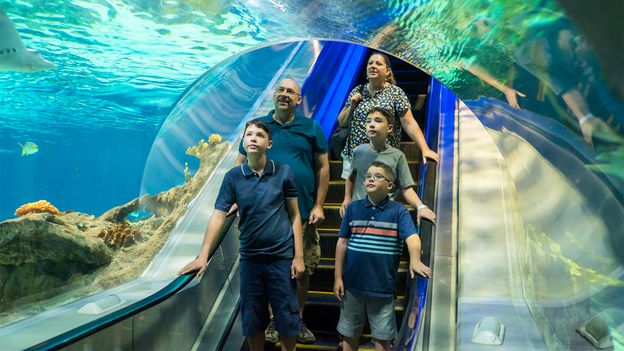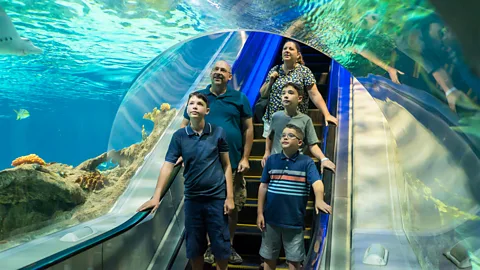 Visit Mesa Autism Travel
Visit Mesa Autism TravelTraveling can be uncomfortable for neurodivergent people, especially those on the autism spectrum. More and more hotels, restaurants, and cities are making efforts to accommodate these visitors.
From long lines to security checkpoints, delayed flights, crowded trains, and traffic jams, traveling can be an uncomfortable ordeal. But for some people, the stress of travel can be even more intense. Crowded, noisy spaces, complicated social interactions, and sudden changes in routine are especially challenging for neurodivergent travelers, including those with autism spectrum disorders.
Travel can also be very enriching for autistic people, especially when their needs and sensitivities are taken into account. “I think one of the greatest benefits of travel is that it gives us the opportunity to delve deeper into the idea of what autistic people are capable of,” said Kerry Magrobest-selling author and speaker who was diagnosed with autism at age four. “It can help with social skills, communication, adaptability and also self-awareness, who they are as individuals and what they like to do.”
A few basic skills and simple accommodations can make a big difference in the travel experiences of people with autism, and destinations are increasingly working to provide them to their visitors. For over 20 years, International Council for Accreditation and Continuing Education Standards (IBCCES) provides training to hotels, travel professionals and tourism boards around the world who want to become more welcoming to autistic and other neurodivergent visitors. Currently, there are over 300 businesses listed as certified autism centers, as well as three fully certified destinations, although a few more are currently in the process of certification, including Dubai and the Greater Palm Springs area in the United States.
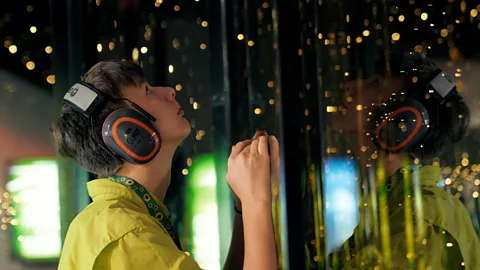 Visit Mesa Autism Travel
Visit Mesa Autism Travel“We incorporate best practices from experts in the field, as well as autistic and neurodivergent people themselves (into our trainings),” Meredith Tekin, president of IBCCES, told the BBC. “So you’ll see people sharing their lived experience and recommendations in the trainings.”
IBCCES offers training focused on sensory awareness and general sensitivity to individuals with autism. They also occasionally conduct site visits to partner hotels and cities to help identify additional opportunities to accommodate autistic travelers. The organization’s goal is to help destinations become more autism-friendly and to help travel industry employees better understand accessibility needs. Once the training is completed, the organization offers certification and lists the businesses on the site Travel for Autismwhich compiles the destinations and attractions that IBCCES considers “autism certified.”
IBCCES offers autism certifications for restaurants, stores, and attractions (called “Autism Certified Centers”), as well as destinations and cities. “Autism Certified Destinations” are locations where most tourism-related organizations in the region have received training, while “Autism Certified Cities” are locations where organizations and businesses in the city have been certified.
The most recent destination to receive certification is Traverse City, Michigan, which achieved certification in August 2024. Traverse City is known for its beautiful natural scenery and proximity to Sleeping Bear Dunes Lake State ParkAccording to Whitney Waara, COO of Tourism in Traverse CityThe motivation for becoming an autism-certified destination was simply the desire to allow more people to enjoy the city. “We’ve really worked to make sure our destination is welcoming to everyone,” Waara said. “Making sure we’re prepared to accommodate every traveler who comes, no matter what their needs are, has been a big priority for us over the last few years.”
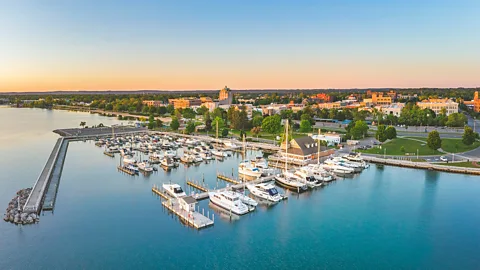 Tourism in Traverse City
Tourism in Traverse CityThe initiative was a particularly exciting project for Traverse City Executive Director Craig Hadley. Dennos Museumwhose son is autistic and appears in the city promotional video highlighting his recent certification. “It seems like a simple thing, but as a parent it means a lot to know that the person you’re talking to sort of understands where you’re coming from and why this resource is important to this family,” Hadley told the BBC.
The museum participated in the certification process, training employees and implementing autism-friendly features, such as quiet spaces, sensory maps, and several noise-canceling headphones for visitors who are particularly sensitive to sound, such as many autistic people. Dennos Museum also planned a few autism-friendly events, such as its Halloween for all.
Traverse City was inspired by Mesa, Arizonawhich became America's first autism-friendly city in 2019, when it was certified by IBCCES. What started as an initiative by the city’s tourism board, sparked by the CEO’s experience as a parent of an autistic child, quickly became a citywide movement when the mayor heard about the plans.
“We started this project and obviously shared it with the mayor and city officials, and it just grew organically,” said Alison Brooks, vice president of destination experience and advocacy at Visit Mesa. “I think it was just one of those events that came at a good time. A lot of people are impacted by autism in some way, shape or form, so we knew it was the right thing to do.”
In order for the entire city to be certified, Mesa had to have at least three businesses and organizations from several industries, including tourism, education and healthcare, go through the process. However, many more businesses in the city signed up, so much so that Mesa now offers a certification program.Live a life without limits” passport that lists all certified centers in the city, including hotels, restaurants and attractions. The Travel for Autism The Visit Mesa website page also offers free sensory guides to seven of the city's most popular destinations, which can be downloaded and viewed online before visitors leave home.
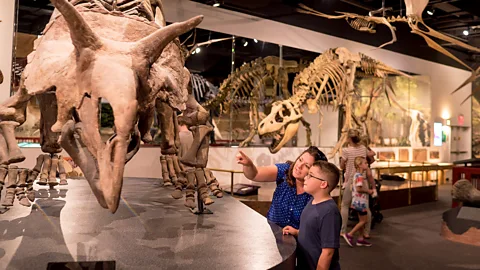 Visit Mesa Autism Travel
Visit Mesa Autism Travel“Almost every day I meet someone who didn’t know the city had achieved certification,” Brooks said. “But every time I talk to a resident … it’s a sense of pride that they feel.”
For Magro, the growing willingness of cities and destinations to educate themselves about autism and become more accommodating to neurodivergent travelers is a positive sign. “I really hope this is not a passing fad,” he said, “but a (new) reality that our community will embrace with open arms.”

